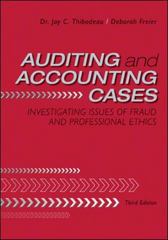WorldCom generally maintained its own lines for local service in heavily populated urban areas. However, it relied
Question:
WorldCom generally maintained its own lines for local service in heavily populated urban areas. However, it relied on non-WorldCom networks to complete most residential and commercial calls outside of these urban areas and paid the owners of these networks to use their services. For example, a call from a WorldCom customer in Boston to Rome might start on a local (Boston) phone company’s line, flow to WorldCom’s own network, and then get passed to an Italian phone company to be completed. In this example, WorldCom would have to pay both the local Boston phone company and the Italian provider for the use of their services.1 The costs associated with carrying a voice call or data transmission from its starting point to its ending point were called line cost expenses.
Line cost expenses were WorldCom’s largest single expense. They accounted for approximately half of the company’s total expenses from 1999 to 2001. World-Com regularly discussed its line cost expenses in public disclosures, emphasizing, in particular, its line cost E/R ratio—the ratio of line cost expense to revenue.2 GAAP for Line Costs Under Generally Accepted Accounting Principles (GAAP), WorldCom was required to estimate its line costs each month and to expense the estimated cost immediately, even though many of these costs would be paid later. To reflect an estimate of amounts that had not yet been paid, WorldCom would set up a liability account, known as an accrual, on its balance sheet. As the bills arrived from its outside parties, sometimes many months later, WorldCom would pay them and reduce the previously established accruals accordingly.3 Because accruals are estimates, a company is required under GAAP to reevaluate them periodically to see if they have been stated at appropriate levels. If charges from service providers were lower than estimated, an accrual is “released.” The amount of the release is set off against the reported line cost expenses in the period when the release occurred. For example, if an accrual of \($500\) million was established in the first quarter and \($25\) million of that amount was deemed excess or unnecessary in the second quarter, then \($25\) million should be released in that second quarter, thus reducing reported line cost expenses by \($25\) million.4 WorldCom’s Line Cost Releases Beginning in the second quarter of 1999, management allegedly started ordering several releases of line cost accruals, often without any underlying analysis to support the releases. When requests were met with resistance, management allegedly made the adjustments themselves. For example, in the second quarter of 2000, David Myers, a CPA who served as senior vice president and controller of World-Com, requested that UUNET (a largely autonomous WorldCom subsidiary at the time) release \($50\) million in line cost accruals. UUNET’s acting CFO David Schneeman asked that Myers explain the reasoning for the requested release, but Myers insisted that Schneeman book the entry without an explanation. When Schneeman refused, Myers wrote to him in an e-mail, “I guess the only way I am going to get this booked is to fly to DC and book it myself. Book it right now, I can’t wait another minute.” After Schneeman refused again, Betty Vinson in general accounting allegedly completed Myers’s request by making a “top-side” corporatelevel adjusting journal entry releasing \($50\) million in UUNET accruals.
Case Questions
1. Consider the principles, assumptions, and constraints of Generally Accepted Accounting Principles (GAAP). Define the matching principle and explain why it is important to users of financial statements.
2. Based on the case information provided, describe specifically how World-Com violated the matching principle.
3. Do you believe that WorldCom had established an effective system of internal control over financial reporting related to the line cost expense recorded in its financial statements? Why or why not?
4. As an auditor at WorldCom, what type of evidence would you want to examine to determine whether the company was inappropriately releasing line costs? Please be specific.
5. Consider the actions of David Schneeman and Charles Wasserott. Do you believe that these employees should have recorded the journal entries as directed by Senior Vice President and Controller David Myers? Why or why not?
Step by Step Answer:

Auditing And Accounting Cases Investigating Issues Of Fraud And Professional Ethics
ISBN: 9780078110818
3rd Edition
Authors: Jay Thibodeau, Deborah Freier





